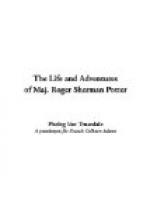country, I came over not long since, and sought the
city of Boston, it being, as many had told me, the
great center of America’s learning and refinement.
There I gave a lecture or two; but being a stranger,
and deformed withal, the reception I met was cold
and discouraging. Against such men as Lowell,
and Curtis, men born on the soil, and of such goodly
person as made them the pets of the petticoats and
pantaletts, I could not hope to succeed. In truth,
I gave up, sick at heart, clean only in pocket, and
with the alternative of a garret and a crust staring
me in the face, in a land of plenty. At length
a friendly hand came to my succor, and through it
I was invited by a committee, composed of the tavern
keeper, the schoolmaster, the Unitarian clergyman,
and the milkman, (who had a relish for letters,) to
deliver three lectures in this town, for which they
promised to pay me five dollars a lecture, and my
victuals. Yes, sir, my victuals. Five dollars
and victuals for a learned lecture was something for
a man whose pocket stood much in need of replenishing.
I came, disposed to do to the best of my ability;
and the victuals I have had, and they are good.
I chose Crabbe for the subject of my lecture, in deference
to my own taste, and also because I was led to believe,
judging from analogy, that the knowledge of men of
letters which ruled in Boston, must also rule in the
villages and towns round about. It was that which
led me to announce Crabbe, which announcement has
much disturbed the town. No one seems to know
who or what manner of man he was, and many curious
questions have been put to me concerning his origin,
the things he did while living, the manner of his
death, and what was said of him afterwards. Several
inquisitive old ladies, who called to see me to-day,
put many questions concerning his morals and religion.
Not entertaining a doubt of his loving all religion
that was founded in truth and reason, I sent them
away fully satisfied that Mr. Crabbe was a man of
good standing in the church. You will remember
sir, it was Crabbe who said, ’There sits he upright
in his seat secure, As one whose conscience is correct
and pure.’”
Here he continued to repeat several of the most beautiful
lines written by that poet, and which are familiar
to his readers.
“An unhappy sort of man, clothed in the garb
of a mechanic, and calling himself a nonresistant,
has several times called to inquire if Mr. Crabbe,
of whom I proposed to speak, was an advocate of physical
resistance. Not being able to satisfy him upon
this point, he has sought in divers ways to pick a
quarrel with me.” Just at this moment the
door opened, and there entered to the evident annoyance
of the little deformed man, one Ephraim Flagg, a clicker
of shoes, and an ex-stagedriver. He was lean and
low of figure, had a long bony face, and a gloomy
expression of countenance, and a straight, narrow
forehead, and coarse, silvery hair, that stood erect
upon his head. “I have come again, you see;




